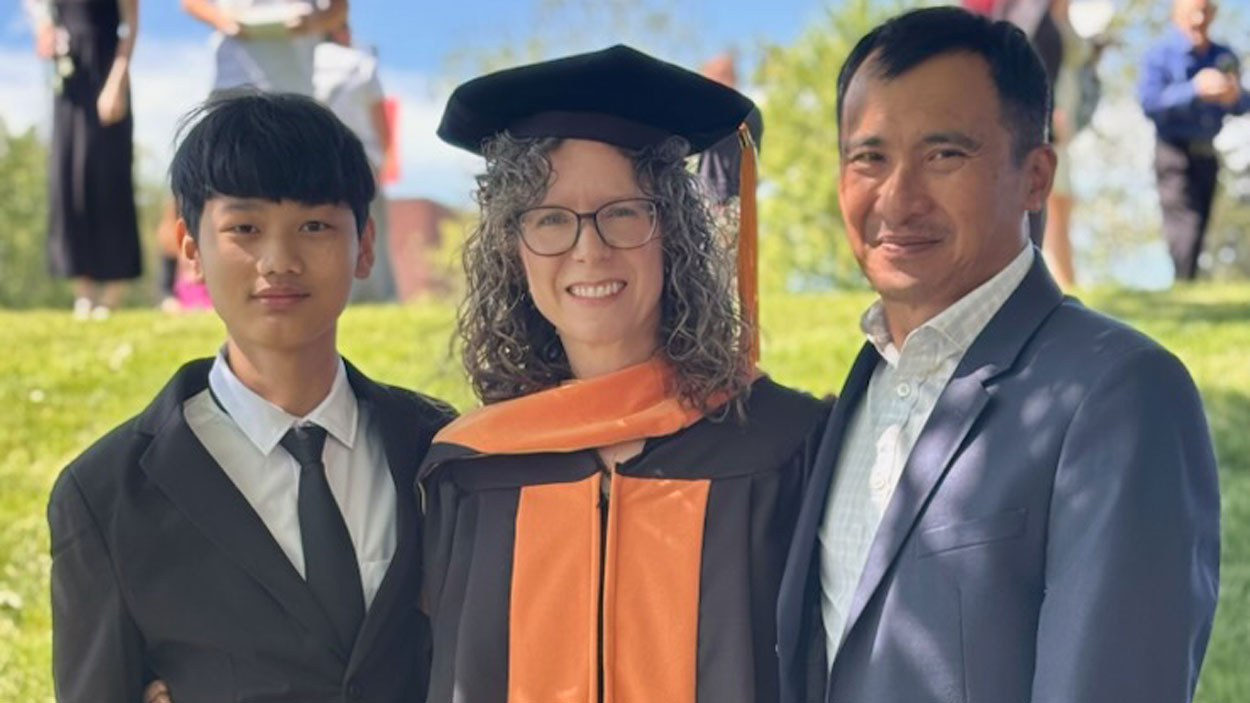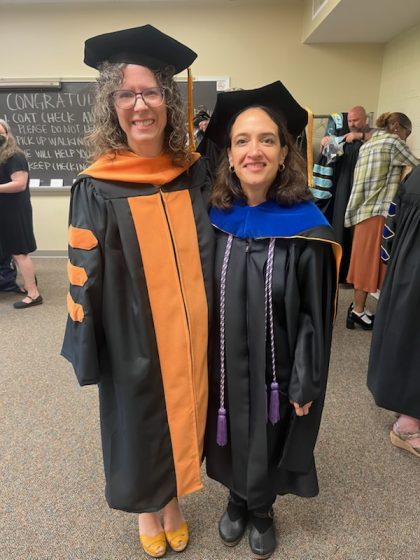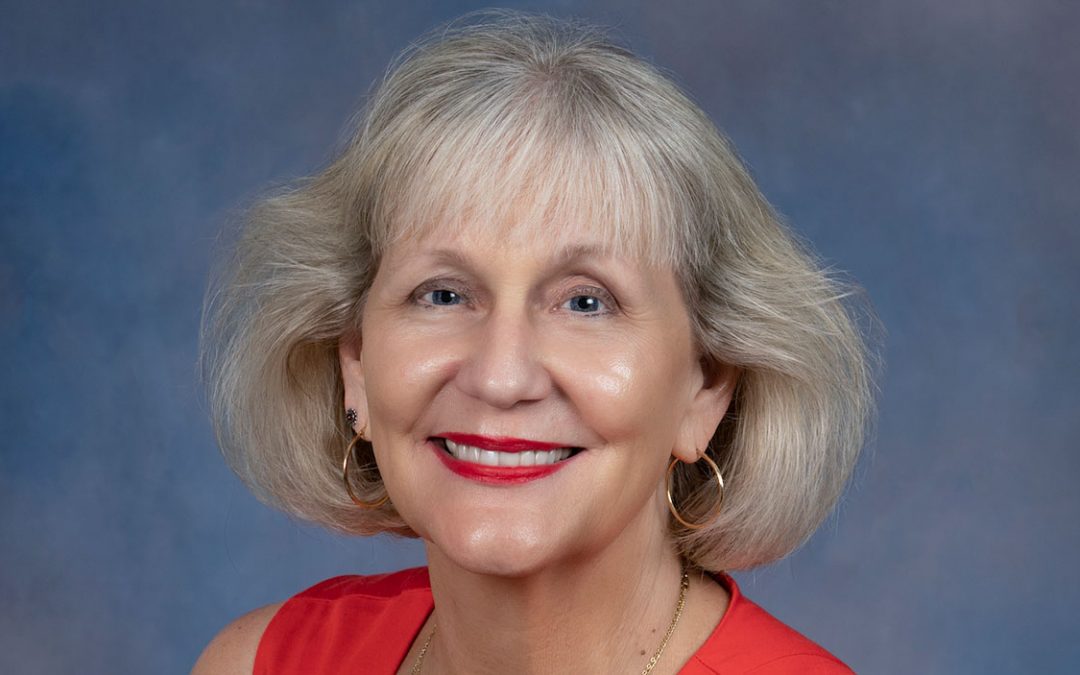
Erin Doan, pictured with her family, recently earned her PhD in nursing from UMSL. A longtime nurse, she was inspired to go back to school for her doctorate after her husband was seriously injured in a car accident and she began conducting research on stroke survivors (Photo courtesy of Erin Doan)
Erin Doan firmly believes that “a life saved is a life worth living.”
The quote, which Doan heard during the European Life After Stroke Forum, emphasizes the importance of advancing stroke care and not forgetting about people who have long-term neurological injuries. It’s a sentiment that rings true for Doan in both her personal and professional life.
Doan, who earned her PhD from the College of Nursing at the University of Missouri–St. Louis earlier this year, was inspired to go back to school for her doctorate after her husband was seriously injured in a car accident.
A longtime nurse practitioner, Doan had recently pivoted from working in internal medicine and substance abuse to neurology when she and her husband were involved in a five-car accident resulting from a police pursuit in 2019. Doan was hospitalized for a week and her husband was hospitalized for three months; when he was finally discharged, he required 24-hour care and extensive rehabilitation due to permanent spinal cord and brain injuries.
“It provided this dimension that I never had, going from being a bedside nurse and a nurse practitioner to illness adaptation and recovery,” Doan said. “It also led me to looking for advancing knowledge, which is what a PhD nurse does, because during the pandemic we all were really given back time, in a way, because we were restricted on how we could move through our world.”
As she cared for her husband, Doan started learning even more about neurological injuries – for instance, she discovered that depression occurs in one in four patients post-stroke. She began to see similarities between the experiences of her husband and her neurological patients at St. Luke’s Health System in Kansas City and became increasingly interested in research on stroke patients. That’s when she came across an article by Lori Gray, a stroke survivor and psychologist working at Western Michigan University, about a mindfulness-based stress reduction program that could help support recovery from stroke.
“The program is based on Buddhist psychology and similar to cognitive behavioral therapy in that you focus on the present moment,” Doan said. “This program introduces a range of experiential mindfulness exercises designed to build awareness by intentionally focusing attention on the present moment, without judgment, drawing on Jon Kabat-Zinn’s foundational definition. Offered in a supportive group format, it empowers stroke survivors to learn not only from the practices themselves but also from the shared experiences and insights of other stroke survivors.”
Shortly after reading the article, Doan reached out to Gray and formed a research team in 2021 to develop a proposal for a mixed-methods pilot study incorporating Gray’s model. She soon realized she didn’t have the research skill set needed to execute the project, though, and in 2022, she enrolled in UMSL’s PhD in Nursing program. Her first class was Associate Professor Julie Bertram’s qualitative research course, and she quickly fell in love with Bertram’s style of teaching and qualitative research in general.

Erin Doan (left) took her first PhD class with Dr. Julie Bertram (right), who later served as chair on her dissertation committee. (Photo courtesy of Erin Doan)
“I loved the content that we were learning – this new way to engage with patients to not only make their voices heard, but also to advance knowledge,” Doan said. “And to me, just being in the neurology field, inpatient, outpatient, it’s one area of medicine where it is really important to get a detailed history. That aspect really drew me to that field. In qualitative research, it’s really important that you spend time with the patient, so it felt like a natural fit for me.”
Doan appreciated that the College of Nursing faculty and staff worked closely with her to advance her knowledge and felt that her vision was fully supported, despite never having done research before. For her project, “Building a Grounded Theory of Resilience in Chronic Stroke Patients,” she recruited eight participants from her clinic at St. Luke’s to test Gray’s model, implementing focus groups and individual interviews over the course of 13 months. Participants – including some just six months out from their stroke and others decades out from their stroke – showed modest improvements in quality of life and resilience, including better sleep, less stress and more feelings of relaxation. The project emphasized the importance of social support and emotional regulation and showed how mindfulness can help meet unmet emotional needs for stroke survivors.
“People loved the program,” Doan said. “I think what was most successful about it was bringing them together because they were all stroke survivors. Many of them did not have somebody in their life who had experienced a stroke, so just bringing them together in both cycles seemed to be mutually impactful for their recovery and understanding the kinds of things that they went through.”
Doan, who successfully defended her dissertation in June, is in the process of submitting her research to different journals. She notes that there is a paucity of research on resilience in stroke, and she believes her research could have far-ranging impacts for stroke survivors.
“It looks at a population that has less access to health care,” Doan said. “It’s a population where there’s not a big safety net to bring them back into providers and then identify these problems. The more we can gain knowledge about resilience, the more we can understand the experience of stroke, and then we can provide tools to help people live their best life. We identified that using mindfulness was one way to become a better version of themselves, whether in gaining acceptance or trying to find meaning in their lives. I hope that this work will help people over time.”
Doan recently applied for dedicated research time in her role at St. Luke’s Health System, which would give her the ability to devote some of her clinical time to continue her research on resilience in stroke patients, but she knows she will continue to engage in research either way. She’s grateful for her experience in the PhD program at UMSL, which gave her not just a research skill set but newfound confidence in her abilities.
“It has allowed me to work with people in a way that I never imagined, and that has been incredibly satisfying to be able to really have the time to listen and understand people beyond just meeting their needs,” Doan said. “It’s been incredibly meaningful to work with other professionals, to work with psychologists and to work with the stroke survivors so closely, including some who maybe didn’t feel like they had had a voice before. Personally, I feel like I’ve developed new skills where I can work in a different way and have the confidence to do something that I wanted.”














